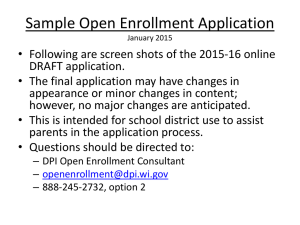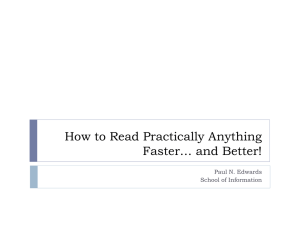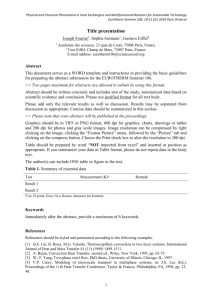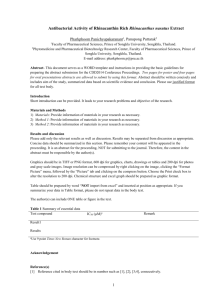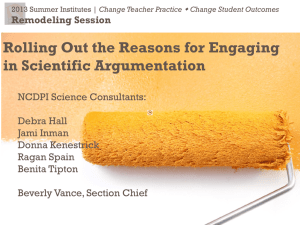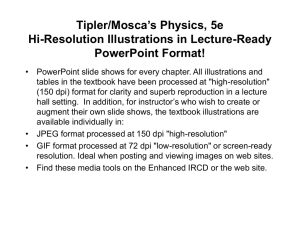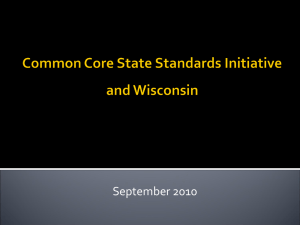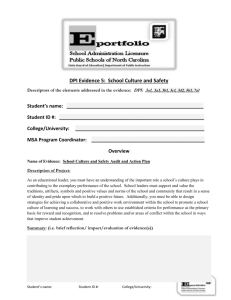DPISciencePres.ncagt2012 - AIG WIKI
advertisement
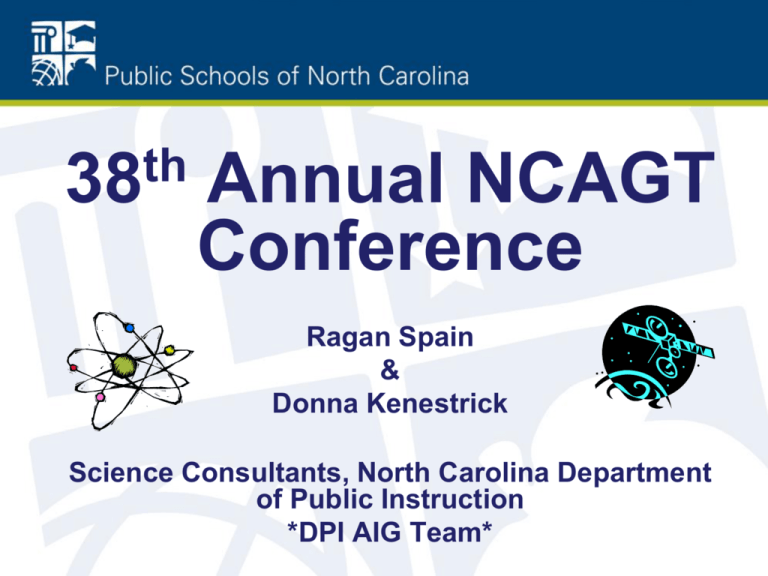
th 38 Annual NCAGT Conference Ragan Spain & Donna Kenestrick Science Consultants, North Carolina Department of Public Instruction *DPI AIG Team* • Introductions Today’s Agenda • DPI’s Science Section • Essential Standards • DPI’s Support Strategies for Essential Standards • DPI’s AIG Supports •Science Resources for AIG Students •Five Ways to Differentiate for Science •Evaluation Introductions Science Updates Science at the North Carolina Department of Public Instruction The Science Section Curriculum and Instruction, DPI Beverly Vance, Science Section Chief Debra Hall , K-5 consultant Donna Kenestrick, K-5 consultant Benita Tipton, 6-8 consultant Jami Inman, 9-12 consultant Ragan Spain, 9-12 consultant Victoria Ewing, program assistant Science Service Delivery Assignments Alleghany Ashe Surry Jackson Macon Cherokee Catawba Rutherford Polk Chatham Pitt Transylvania Clay Lee Stanly Gaston Mecklenburg Martin Wilson Rowan Cabarrus Cleveland Bertie Nash Edgecombe Lincoln Henderson Hertford Wake Randolph McDowell Gates Warren Franklin Durham Davidson Iredell Burke Graham Orange Alamance Davie Alexander Yancey Buncombe Vance Granville Forsyth Guilford Swain Person Caswell Halifax Yadkin Caldwell Haywood Northampton Rockingham Wilkes Watauga Mitchell Avery Madison Stokes Johnston Harnett Washington Tyrrell Dare Beaufort Hyde Greene Wayne Moore Montgomery Lenoir Craven Pamlico Union Anson Richmond Hoke Cumberland Sampson Jones Duplin Scotland Onslow Robeson Carteret Bladen Pender New Hanover Columbus Region 1 Ragan Spain – ragan.spain@dpi.nc.gov--(919)-807-3950 Region 2 Benita Tipton – benita.tipton@dpi.nc.gov--(919)-807-3933 Region 3 Debra H/Donna K Region 4 Jami Inman – jami.inman@dpi.nc.gov--(919)-807-3607 Region 5 Donna Kenestrick – donna.kenestrick@dpi.nc.gov--(919)-807-3863 Region 6 Debra Hall – debra.hall@dpi.nc.gov--(919)-807-3814 Region 7 Jami Inman Region 8 Ragan S/ Benita T Brunswick Beverly G. Vance, Science Section Chief beverly.vance@dpi.nc.gov 919-807-3936 Victoria Ewing Program Assistant/Science 919-807-3929 victoria.ewing@dpi.nc.gov …saying Goodbye to the SCOS… SCIENCE Essential Standards • Approved since February, 2010 • Can be accessed at http://www.dpi.state.nc.us/acre/standards/newstandards/#science Why Essential Standards? • To prepare productive and informed citizens who can be successful now and in the future • Focused on what students NEED TO KNOW, not what’s nice for them to know • Delineates what students should know and be able to do • FEWER, CLEARER, HIGHER What’s the Difference? •Essential Standards/Clarifying Objectives focus on the COGNITIVE PROCESS. •Goals/Objectives focus on BEHAVIORAL GOALS and TASKS. They are often more instructional in nature. vs. Just like the Standard Course of Study The new essential standards are the to be taught… Acceleration…..Sophistication …Enrichment • Probe DEEPER…with a focus to future standards. • Move on in a directed way. • Guide student research. • Use the Essential Standards as a “springboard.” • Include the “Five Ways” Environmental Literacy Plan • No Child Left Inside legislation • Shows how NC K-12 educational system will prepare students for addressing environmental challenges • Provide field experiences as part of school curriculum • Ongoing PD for teachers to improve environmental knowledge and skills The Conceptual Framework & Next Generation Science Standards NEW National Standards in Science • Conceptual framework was released during the past summer; final version now available • ACHIEVE is in the process of developing draft versions of the next generation of standards • NC is participating as a lead state Assessment Updates Next Generation Assessments • • • North Carolina is on track to achieve full online administration of assessments by 2014-15. The following time line outlines the steps that will take place each year to make this happen: 2011‐12: Stand‐alone field testing of new assessments (Math, Science, ELA) 2012‐13: Summative assessments aligned to CCSS (for ELA and Mathematics) and NC Essential Standards (for Science) will be administered operationally 2014‐15: Expected assessments operational from Smarter Balanced Assessment Consortium (shared between states) in ELA/Math 3‐8 and one High School Assessment in ELA and Math (w/ Performance Tasks in 9 & 10) http://www.k12.wa.us/smarter/. Assessment… Online Assessment Website http://www.dpi.state.nc.us/acre/assessment/ online/ Please contact the following NC DPI staff for more information: • Kayla Siler kayla.siler@dpi.nc.gov • Jim Kroening jim.kroenig@dpi.nc.gov • Tracey Greggs tracey.greggs@dpi.nc.gov …Assessment continued… Best Practices Guide http://www.ncpublicschools.org/acre/assessment/guide/ Online Assessment Tutorial (accessed through NC Education) Test specifications LINK http://www.ncpublicschools.org/acre/assessment/online/ Literacy and Writing in Science • Common Core Literacy Standards in Science and Technical Subjects • The standards begin at grade 6 • Standards for K–5 reading in history/social studies, science, and technical subjects are integrated into the K–5 Reading standards. • For more information: http://www.corestandards.org/the-standards Literacy and Writing in Science • The Online Writing Instruction System • North Carolina is implementing a new system • designed to provide students with opportunities to have a variety of experiences throughout the school year • not an assessment, but a formative tool to monitor the progress of students in writing and adjust instruction • replaces the previous Writing Instruction System. Supports for Implementation DPI Modules • On the DPI ACRE web site, find the PD menu on the left side of the page: http://www.ncpublicschools.org/acre/profdev/ • Includes online, onsite, real-time and asynchronous offerings NC Education http://center.ncsu.edu/nc/ Includes tutorials and other informative links – to access NC FALCON, Online Writing Instruction, Primary Artifact Questions (PAQs), NC Test, etc. NC Education is a large-scale managed Moodle system with specialized additions to support professional development, student learning, accountability processes, and information delivery. LIVE Training Sessions • Science and Social Studies RESA presentations (2011-2012) have been completed • Next Round of RESA presentations for Common Core Literacy and Math have begun • Summer Institutes are planned & scheduled • Live Webinars and follow ups will continue throughout the 2012-2013 school year Science Webinars September 22, 2011 November 29, 2011 February 28, 2012 April 25, 2012 Webinar I Webinar II Webinar III Webinar IV *all webinars will be archived and posted to our Science WIKI Science Web Pages • Science WIKI http://scnces.ncdpi.wikispaces.net/ • Science Sharp School site http://science.ncwiseowl.org/ • ACRE Science http://www.dpi.state.nc.us/acre/standards/new-standards/ • SCOS http://www.dpi.state.nc.us/curriculum/science/ Science WIKI • http://scnces.ncdpi.wiki spaces.net/ • Enter as a guest OR create a wiki account and send a request to join us Science WIKI • http://scnces.ncdpi.wiki spaces.net/ • Enter as a guest OR create a wiki account and send a request to join us Curriculum Topic Study • Webinar Series • A deep dive into the content and pedagogy connected to specific Science Essential Standards Curriculum Topic Study • Customized Guides for North Carolina’s Essential Standards have been developed by DPI and are posted on the Science WIKI AIG Supports from DPI • http://www.ncpublicsch ools.org/academicservi ces/gifted/ Differentiate for AIG students Differentiated Instruction Includes: Content: complex, abstract ideas (conceptual understanding) Process: higher-level thinking though Bloom’s Taxonomy Products: Alternative methods of demonstrating mastery with a range of complexity Learning Environment – Student-centered, flexible grouping based on readiness, interests and abilities Assessments – Pre-assessment and testing out-of grade level curriculum Five Ways of Differentiating Science for the AIG Learner STEM Activities PBL Competitions Museum Programs University Programs STEM is EVERYWHERE! Why STEM? • Demand for talent pool • Provides opportunities for excellence and advanced study beyond the basic curriculum • Provides inspiration and excitement to learners Stem Resources NASA BEST K-8 Engineering http://www.nasa.gov/audience/foreducators/best/ Intel Design and Discovery http://www97.intel.com/en/DesignDiscovery/ A World in Motion http://www.awim.org/about/ Project lead the Way http://www.pltw.org/ NSF STEM Education http://www.nsfresources.org/home.cfm Project Based Learning Why PBL? • Teaches problem identification and solution • Involves active learning •Can challenge at varied ability levels • Applies higher order thinking • Inherently interdisciplinary • Uses real and authentic problems PBL Resources PBL (how to set up) http://pbl-online.org/ PBL Resources http://www.teachscienceandmath.com/tag/pbl/ PBL@UD (clearing house) http://www.udel.edu/inst/resources/sample-problems.html National Center for Case Study Teaching in Science http://serc.carleton.edu/introgeo/icbl/resource.html 30 Online PBL Resources http://21centuryedtech.wordpress.com/2012/02/11/30-online-multimediaresources-for-pbl-and-flipped-classrooms/ Competitions Why Competitions? • Inspirational • Develops leadership • Challenge • Exercise full potential • Set and achieve more personalized goals Competitions • Exploravision (K-12) http://exploravision.org/ • NCSO http://www.sciencenc.com/ • Future City Engineer competition (6-8) http://futurecity.org/getting-started/team-formats • Odyssey of the Mind (K-16) http://www.odysseyofthemind.com/learn_more.php • eCybermission (6-9) https://www.ecybermission.com Museum programs Why Museum Programs? •Access to collections, alternative learning environments •Experiences not available elsewhere •Public resources •Emphasizes connections of collections within a region as well as nationally, internationally •Profound interpretation of the present and future Museum Programs • NC Museum of Life and Science http://www.ncmls.org/ • NC Museum of Natural Sciences http://naturalsciences.org/education • Discovery Place (Charlotte) http://www.discoveryplace.org/education/ • North Carolina Zoo (Asheboro) http://www.nczoo.org/education/index.html • North Carolina Aquariums http://www.ncaquariums.com/ University Programs Why University Programs? • Connect students to others with special interests • Connect students to information about career pathways • Connect students to professionals within a given field • Connect students to state of the art information and resources • Provide an alternative learning environment University Programs The Science House at NC State http://www.science-house.org/ UNCCH: Pre-College Program http://www.unc.edu/depts/ed/pcp/activities.htm Duke Center for science Education http://www.scied.duke.edu/ East Carolina University Center for STEM Education http://www.ecu.edu/educ/csmte/ UNCCharlotte Center for STEM Education http://education.uncc.edu/cstem/ Evaluation Adjournment
